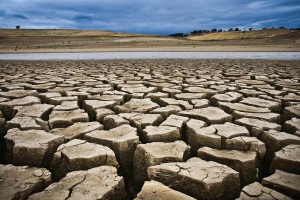By Bill Disbrow
We may someday have to stop calling our drought a temporary phenomenon and just label it the new normal. Climate change could lock the state into a dry pattern lasting centuries or even a millennia if history repeats itself, according to a new study out of UCLA.
Researchers correlated findings from Sierra Nevada soil samples and found that energy changes from natural occurrences like a shift in the Earth’s orbit or sun spots may have triggered prolonged dry weather in California. In the Nature.com journal Scientific Reports, the team argues that current radiative forcing – energy change brought on by greenhouse gas emissions – may create a similar prolonged dry pattern in the Golden State.
“Radiative forcing in the past appears to have had catastrophic effects in extending droughts,” UCLA professor Glen MacDonald said in a university publication. “When you have arid periods that persist for 60 years, as we did in the 12th century, or for millennia, as we did from 6,000 to 1,000 B.C., that’s not really a ‘drought.’ That aridity is the new normal.”
From 6,000 to 1,000 B.C., the core sample indicates a 5,000-year dry period in California that had been suggested by previous research. That period was linked to a slight change in Earth’s orbit that resulted in increased solar energy in the Northern Hemisphere and creating La Niña conditions.
MacDonald’s team correlated historic radiative forcing with increased water temperatures in our oceans, likely creating more La Niña and El Niño weather patterns during previous dry spells. If greenhouse gasses persist, MacDonald warns that we could see more of these boom-or-bust winters, potentially bringing a significant change to California’s ecosystems.
“In a century or so, we might see a retreat of forest lands, and an expansion of sagebrush, grasslands and deserts,” MacDonald said in the UCLA release. “We would expect temperatures to get higher, and rainfall and snowfall would decrease. Fire activity could increase, and lakes would get shallower, with some becoming marshy or drying up.”
MacDonald stressed that his study can’t be used to predict the future, but it does offer cause for concern.




One Response to UCLA researchers warn that centuries of drought could return to California – from the San Francisco Chronicle